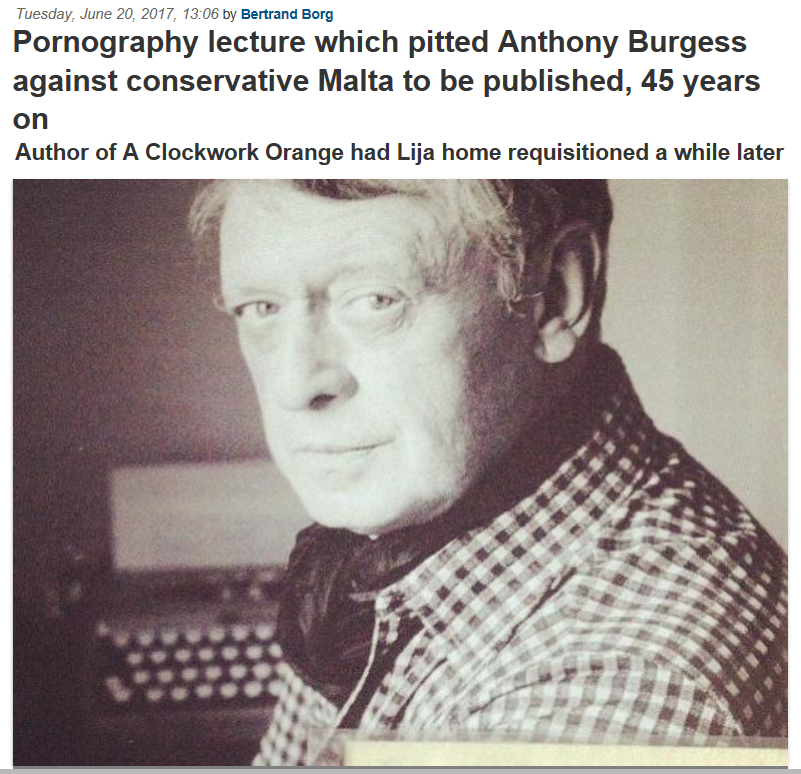Earthly Powers: the way Malta is now is the result of the way it was then
I read this story in the Times of Malta. None of it was new to me.
I knew that Anthony Burgess moved to Malta in the late 1960s, when Malta was as glamorous as Ibiza is today and Gozo was the Formentera of the time, but without the nudity – before Mintoff was elected in 1971 and put a permanent rocket under the glamour.
I knew that he had had all his books checked on arrival by the censorship authorities, because all imported books, even for personal use and not for retail, were checked that way. The censorship regulations and authorities had nothing to do with the Catholic Church. They were state regulations and government authorities, and even the Labour government of 1971 to 1987 retained them and used them, despite an all-out war with that very same Catholic Church.
I knew that Anthony Burgess had some of his books confiscated by the government authorities and that he was, understandably, outraged. It wasn’t just the patronising thinking implicit in censorship. It was the legalised theft of his personal property.
And I also knew that one of the first things Mintoff’s incoming Labour government did in 1971 was wait until Mr Burgess went to Rome on holiday with his family and seize – under Malta’s archaic but still extant ‘requisition’ laws – his beautiful old Lija villa, a few doors away from the Three Villages Bar.
He never returned to Malta, and who can blame him – but he fictionalised the experience in a few chapters of his epic novel, Earthly Powers, published in 1980 – a copy of which has been buried somewhere on my bookshelves, its pages foxed and its cover curled by damp, for the last 30 years. I can’t remember much of it, beyond its killer opening line (which I had to look up again): It was the afternoon of my eighty-first birthday, and I was in bed with my catamite when Ali announced that the archbishop had come to see me.
But what I didn’t know is that people blame the Catholic Church, rather than the politicians of the day, for what transpired then. And I didn’t know, either, that they can’t see the obvious: that the way Maltese society was then is the reason for the way Maltese society has changed only superficially since.
When aggressive book censorship and the legalised theft of personal property – from books to entire houses and stretches of land – by a series of autocratic governments are accepted as a fact of life, almost an act of God about which we can do nothing, then why should we be surprised that we are where we are today, with people not only accepting but actually encouraging government autocracy and politicians behaving like robber barons at the toll-bridge.
The comments beneath the story are all about how the Catholic Church, a convenient scapegoat that absolves us, we think, from the need to blame ourselves, was responsible for all that transpired then. This, too, is part of the wider failure of Maltese people to frame situations in a wider context – because to do that, you need the contextual information to begin with. Britain has no Catholic Church, but well into the 1970s it had aggressive prosecutions under its harsh Obscene Publications Act.
And I didn’t know, either, that in a society so obsessed with land, property, real estate, owning your own home and several other flats besides, people would completely ignore the fact that Dom Mintoff’s incoming government seized Anthony Burgess’s Lija villa while he was on holiday, and instead home right in on his censored books and begin beating the Church with a big stick for that (when it wasn’t even the Church that took his books in the first place).
Fascinated by this political myopia, and unable to resist yanking some chains, I posted a response to one of those people, asking him what he thinks is worse – the confiscation of some books by the state censors, or the legalised theft of a large house in Lija by the incoming Prime Minister, while its owner was on holiday? He has not replied so far. People don’t like being forced face up against their own prejudices and warped thinking.
Much of the article in the Times of Malta centres on an interview with Mr Burgess, written by Marie Said for that same newspaper in 1970. How odd, I thought, that they don’t seem to know that Marie Said, as she was then, is Marie Benoit – who blames Catholicism and religiosity for everything, including the confiscation of Mr Burgess’s books, but then glosses over, in her conscience, the fact that the political party she supports so fervently right up until today began its term in power in 1971 by waiting until Mr Burgess went on holiday and confiscating his house.
He was a foreigner, so he must have been in league with traitors.

